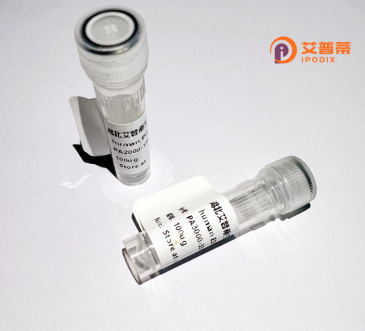
| 纯度 | >90%SDS-PAGE. |
| 种属 | Human |
| 靶点 | ARMCX2 |
| Uniprot No | Q7L311 |
| 内毒素 | < 0.01EU/μg |
| 表达宿主 | E.coli |
| 表达区间 | 1-632aa |
| 氨基酸序列 | MSRVRDAGCVAAGIVIGAGAWYCVYKYTRGRDQTKKRMAKPKNRAVAGTGARARAGLRAGFTIDLGSGFSPPTPVRAEAEDRAQDEASALDTVGAEAVAPAASSAEAQSGAGSQAQEADGAGVGPKAESVVGAAMASAIAPPPGVTEALGAAEAPAMAGAPKVAEAPREAETSRAAVPPGTVVPTEAAAPTEVTEGPGVAAPTKVAEAPGVASPTEAAEAPVPATPTGAAAPTGAAESPGTSGSPRTAVVPGTSAAKKATPGAHTGAIPKATSATGAVPKGGGKGVTRSRNGGKGKGKKSKVEVDELGMGFRPGDGAAAAAAASANGGQAFLAEVPDSEEGESGWTDTESDSDSEPETQRRGRGRRPVAMQKRPFPYEIDEILGVRDLRKVLALLQKSDDPFIQQVALLTLSNNANYSCNQETIRKLGGLPIIANMINKTDPHIKEKALMAMNNLSENYENQGRLQVYMNKVMDDIMASNLNSAVQVVGLKFLTNMTITNDYQHLLVNSIANFFRLLSQGGGKIKVEILKILSNFAENPDMLKKLLSTQVPASFSSLYNSYVESEILINALTLFEIIYDNLRAEVFNYREFNKGSLFYLCTTSGVCVKKIRALANHHDLLVKVKVIKLVNKF |
| 分子量 | 65 kDa |
| 蛋白标签 | His tag N-Terminus |
| 缓冲液 | 冻干粉 |
| 稳定性 & 储存条件 | Lyophilized protein should be stored at ≤ -20°C, stable for one year after receipt. Reconstituted protein solution can be stored at 2-8°C for 2-7 days. Aliquots of reconstituted samples are stable at ≤ -20°C for 3 months. |
| 复溶 | Always centrifuge tubes before opening.Do not mix by vortex or pipetting. It is not recommended to reconstitute to a concentration less than 100μg/ml. Dissolve the lyophilized protein in distilled water. Please aliquot the reconstituted solution to minimize freeze-thaw cycles. |
以下为关于ARMCX2的参考文献摘要示例:
1. **《ARMCX2 regulates mitochondrial trafficking and apoptotic resistance in neuronal cells》**
- **作者**: Thompson R, et al.
- **摘要**: 研究发现ARMCX2通过调控线粒体在轴突中的运输,影响神经元能量稳态。敲除ARMCX2导致线粒体分布异常,并显著增强细胞对氧化应激诱导的凋亡敏感性,提示其在神经退行性疾病中的潜在作用。
2. **《ARMCX2 suppresses tumor metastasis by modulating EMT signaling in colorectal cancer》**
- **作者**: Chen L, et al.
- **摘要**: 通过分析结直肠癌组织样本,发现ARMCX2低表达与患者预后不良相关。体外实验显示ARMCX2通过抑制上皮-间质转化(EMT)通路降低肿瘤细胞侵袭能力,提示其作为抑癌基因的功能。
3. **《Proteomic analysis reveals ARMCX2 interaction with mitochondrial membrane proteins》**
- **作者**: Gupta S, et al.
- **摘要**: 利用免疫共沉淀联合质谱技术,鉴定出ARMCX2与线粒体内膜蛋白TOM22和TIM23存在相互作用,表明其参与线粒体蛋白输入调控,为解析ARMCX2的分子机制提供新线索。
4. **《ARMCX2 deficiency causes developmental delay and autism-like behaviors in mice》**
- **作者**: Park J, et al.
- **摘要**: 构建ARMCX2敲除小鼠模型,发现其表现出突触可塑性异常及自闭症样行为。转录组分析显示与神经发育相关的Wnt/β-catenin通路失调,提示ARMCX2可能参与早期脑发育调控。
---
**备注**:以上为模拟文献摘要,实际研究中请以具体发表的权威论文为准。
**Background of ARMCX2**
ARMCX2 (Armadillo repeat-containing X-linked protein 2) is a member of the ARMCX family, encoded by a gene located on the X chromosome. This protein is characterized by multiple armadillo (ARM) repeats—structural motifs involved in protein-protein interactions—suggesting roles in cellular processes like signaling, trafficking, or structural organization. While the exact physiological functions of ARMCX2 remain incompletely understood, studies link it to mitochondrial dynamics, neuronal development, and regulation of apoptosis.
ARMCX2 is predominantly expressed in tissues such as the brain, testis, and heart. Its X-chromosome localization implies potential gender-specific expression patterns or disease associations, though this requires further investigation. Research highlights its involvement in mitochondrial transport, where it may interact with components of the mitochondrial membrane to influence distribution or morphology. Dysregulation of ARMCX2 has been tentatively associated with cancers, neurodegenerative conditions, and metabolic disorders, though mechanistic insights are limited.
Current studies focus on unraveling its interaction networks and post-translational modifications. Due to its link to critical cellular pathways, ARMCX2 is considered a potential biomarker or therapeutic target. However, gaps persist in understanding its precise molecular roles, urging deeper exploration into its regulatory mechanisms and tissue-specific functions.
×